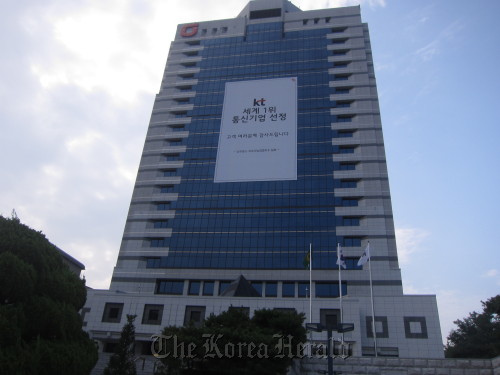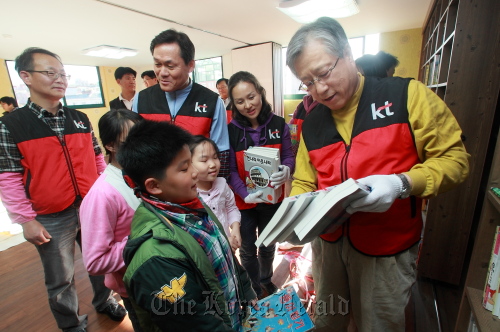Company selected as telecom leader in Dow Jones Sustainability IndexKT Corp. is now among the few companies recognized in the Dow Jones Sustainability Index as a global supersector leader, making its name as one of the most competitive companies not only in Korea, but around the world.
Only those recognized as leaders in sustainability in their industry are selected as global supersector leaders. One firm is chosen from each of the 19 industries categorized according to the Dow Jones classification.
KT was chosen in the telecommunications industry, a first for a local company.
KT nabbed the seat just a year after being included in the Dow Jones Sustainability Index World, which assesses some 2,500 countries.
Along with KT, three others ― Lotte Shopping, Hyundai Engineering and Construction and Samsung Electronics ― were chosen. KT said it was pleased with the success of its peers and hopes to see more included in the Dow Jones Sustainability Index.
The index was jointly created by U.S.-based Dow Jones and SAM of Switzerland in 1999 to become a global standard for evaluating management and investment sustainability.
The biggest feat, KT pointed out, was that the index assesses companies not only based on their financial or economic success, but their overall competitiveness in all sectors, including the extent of their social contribution.

KT headquarters in Bundang, Gyeonggi Province (KT)
At the heart of KT’s achievement is the company’s ceaseless efforts for innovation, spearheaded by KT chairman Lee Suk-chae.
“The innovation led by the chairman was seen to have had an impact on diverse aspects of the Dow Jones Sustainability Index evaluation,” according to Andy Gebhardt, CEO of SolAbility, a sustainability management consultancy.
KT received high marks in assessments on economic, environmental and social areas. More specifically, it was at the top in the seven categories of service development, service influence, response to climate change, talent management, relations between parties of interest, protection of personal information and risk management.
It also scored highly in how it managed its supply chains, a reflection of how KT was managing its relations with vendors and suppliers, industry watchers said, adding that it was evidence that KT had been persevering to help create a level playing field for its smaller peers.
KT said it was particularly satisfied that in five of the 20 assessment criteria, it had received scores that were at least 20 points higher than in the previous year. Those five included sustainability management, service development, response to climate change and human resources development.
KT had made much progress in innovation, having innovated not only products, but also services, research and development, and even internal work procedures.
The Way of Innovative Task Management for High Performance and the Project Expert Group are two of the most significant examples of innovation breakthroughs KT has achieved.
WITH is basically a new system for managing duties. Each employee inputs his or duties in the system, and the manager approves the work to help workers more efficiently start their duties.
PEG was implemented so that problems and issues that had so far been negotiated or addressed by external consultants could now be taken care of internally to save costs and keep personal issues or company matters more private.
The Business Information System Transformation is another result of innovation that is expected to cut the clutter in KT’s current IT system by more than 50 percent, and speed up service procedures.
KT is now expecting to create as much as 360 billion won ($313.1 million) in net present value during 2012-2016.
With the innovation “Business Ideation,” employees are encouraged to come forward with their ideas, which are then processed to help save costs.
Last year alone, these methods cut KT’s costs by 381.8 billion won.
Sustainable management, social contribution
KT has made diverse efforts to promote core values such as ethical management, customer-first management, environment-conscious management, mutual-growth management and social contribution.
“I believe that what we do to make the world a better place is also what makes a company more beautiful, and KT will hope to be at the forefront of such efforts,” the KT chairman said in the company’s sustainability management report for this year.
“IT supporters” is one campaign that reflects the most significant social contribution efforts that KT has been putting in place.
Under the campaign that dates back to 2007, KT shares its IT knowledge with underprivileged people, giving them an IT education.
Multicultural families and store-owners are among those who are currently receiving the benefits of this program.
Last year, KT educated them on how to use smartphones, and also to properly utilize applications and mobile contents.

KT Corp. Chairman Lee Suk-chae (right) talks to children while participating in the company’s volunteer activities. (KT Corp.)
KT now operates 400 volunteer groups organized to offer support and help to underprivileged children, as the company believes that empowering children with the proper IT knowledge is critical for promoting national growth.
As part of such contribution efforts, KT last year opened “Olleh Square,” an area that was designed complete with the latest high-tech communication gadgets to give users and even passers-by an IT and cultural experience all rolled into one.
Global campaigning on issues that matter
KT is also no stranger to campaigns and efforts to promote and fight for issues that matter.
Reducing dependence on fossil energy, promoting eco-friendly energy, improving communication and IT infrastructures and creating a greener workplace are among the initiatives the company has been taking.
With these programs, KT plans to cut greenhouse gas emissions from its workplace and operations by 20 percent by 2013 compared to 2007 levels.
For that purpose, KT has already established solar energy infrastructure to be used for many of its operations.
Smart-working, involving the use of communication technology to avoid having workers coming to the workplace when unnecessary, has also helped cut greenhouse gas, KT said.
Working in tandem with smaller vendors and suppliers is another contribution that KT has been pursuing.
Since June 2009, KT has worked to make sure that smaller companies are not edged out of the competition in biddings.
It also announced the so-called “Three Nots” policy, under which KT will make sure that smaller vendors’ resources are not put to waste, KT will not steal ideas from smaller companies, and will not compete with them.
Promoting mutual growth between bigger and smaller companies is a nationwide campaign that the government has been vigorously promoting in the corporate sector as a part of its efforts to create a “fair society.”
This July, KT released 600 of the 1,000 patents it said it would be offering to vendors for free.
KT currently has a fair trade and mutual growth agreement with 400 or so vendors, and these are the companies that were targets of the free patents. About one-quarter of these firms have already asked about the free patents.
“KT is not stopping with simply not competing with the small and mid-sized companies. It is becoming more proactive by going out there and offering up its patents,” said one industry watcher.
By Kim Ji-hyun (
jemmie@heraldcorp.com)


![[Exclusive] Korean military set to ban iPhones over 'security' concerns](http://res.heraldm.com/phpwas/restmb_idxmake.php?idx=645&simg=/content/image/2024/04/23/20240423050599_0.jpg&u=20240423183955)

![[Graphic News] 77% of young Koreans still financially dependent](http://res.heraldm.com/phpwas/restmb_idxmake.php?idx=645&simg=/content/image/2024/04/22/20240422050762_0.gif&u=)


